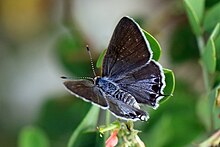| Strymon istapa | |
|---|---|

| |
| Female, Grand Cayman | |

| |
| Cuba | |
|
Scientific classification
| |
| Domain: | Eukaryota |
| Kingdom: | Animalia |
| Phylum: | Arthropoda |
| Class: | Insecta |
| Order: | Lepidoptera |
| Family: | Lycaenidae |
| Genus: | Strymon |
| Species: | S. istapa
|
| Binomial name | |
| Strymon istapa (
Reakirt, [1867])
| |
Strymon istapa the mallow hairstreak, mallow-scrub hairstreak, dotted hairstreak or Hewitson's hairstreak. This diurnal butterfly is a widespread species that can be found in xeric habitats throughout the southern United States, Central America, parts of the Caribbean (including Cuba and Grand Cayman), [1] and rarely in South America. [2] This species can be spotted in rural and suburban areas in which human infringement has created open fields or tracks of overgrown weeds as a result of land clearing. These butterflies are often seen rubbing their hindwings together presumably to attract attention to their antenna mimicry scales located on the outer margin of the hindwing.[ citation needed]
- ^ R. R. Askew and P. A. van B. Stafford, Butterflies of the Cayman Islands (Apollo Books, Stenstrup 2008) ISBN 978-87-88757-85-9, pp. 75-76
- ^ Robbins, Robert (1998). "Taxonomy and Nomenclature of Strymon istapa and S. columella (Lycaenidae: Theclinae: Eumaeini)" (PDF). Journal of the Lepidopterists' Society. 52.
| Strymon istapa | |
|---|---|

| |
| Female, Grand Cayman | |

| |
| Cuba | |
|
Scientific classification
| |
| Domain: | Eukaryota |
| Kingdom: | Animalia |
| Phylum: | Arthropoda |
| Class: | Insecta |
| Order: | Lepidoptera |
| Family: | Lycaenidae |
| Genus: | Strymon |
| Species: | S. istapa
|
| Binomial name | |
| Strymon istapa (
Reakirt, [1867])
| |
Strymon istapa the mallow hairstreak, mallow-scrub hairstreak, dotted hairstreak or Hewitson's hairstreak. This diurnal butterfly is a widespread species that can be found in xeric habitats throughout the southern United States, Central America, parts of the Caribbean (including Cuba and Grand Cayman), [1] and rarely in South America. [2] This species can be spotted in rural and suburban areas in which human infringement has created open fields or tracks of overgrown weeds as a result of land clearing. These butterflies are often seen rubbing their hindwings together presumably to attract attention to their antenna mimicry scales located on the outer margin of the hindwing.[ citation needed]
- ^ R. R. Askew and P. A. van B. Stafford, Butterflies of the Cayman Islands (Apollo Books, Stenstrup 2008) ISBN 978-87-88757-85-9, pp. 75-76
- ^ Robbins, Robert (1998). "Taxonomy and Nomenclature of Strymon istapa and S. columella (Lycaenidae: Theclinae: Eumaeini)" (PDF). Journal of the Lepidopterists' Society. 52.